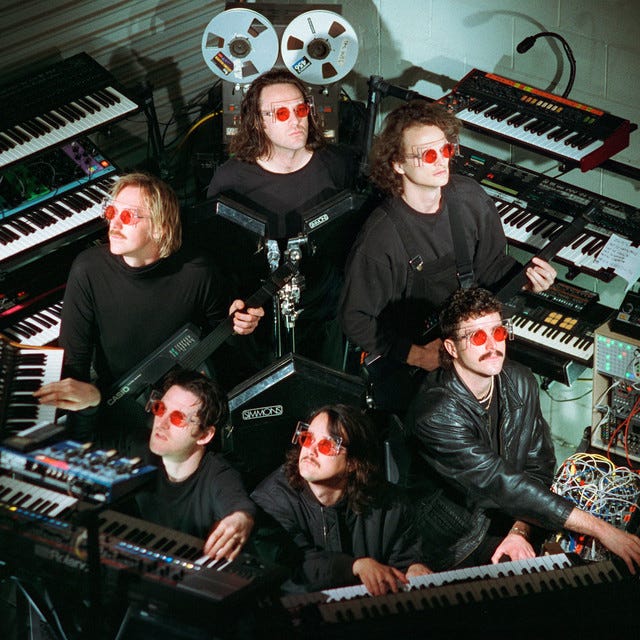The Silver Cord - King Gizzard & The Lizard Wizard
The Silver Cord returns the band's ever-changing sound to an electronic synth soundscape while delivering an epic narrative exploring consciousness, mythology, and spirituality
If you're thinking to yourself "But didn't I just read an ORCA review about King Gizzard and the Lizard Wizard's new album PetroDragonic Apocalypse; or Dawn of Eternal Night: An Annihilation of Planet Earth and the Beginning of Merciless Damnation," don't worry, you're right (and how did you remember that obnoxiously long name?). Five months ago the band released a thrash metal thriller that built upon the themes of human-caused annihilation, climate change, and environmental decay they first explored back in 2019 with Infest the Rats Nest. So of course their next album does a complete one-eighty and dives head-first into deep synths, pulsating beats, and entrancing rhythms. However, the two albums link together more tightly than you'd think. The Silver Cord and PetroDragonic Apocalypse are a "yin and yang thang" according to the band, an interlinked pair of concept albums. Now, while some artists will release concept albums as a culmination of their artistic explorations, King Gizzard conjures up a "concept" album almost twice a year on average. If you truly want to peer into the "Gizzverse" as fans have coined, it's worth keeping that "yin and yang thang" in mind while we take a deep, ethereal look into The Silver Cord.
We begin the album with "Theia", an introduction to the grand cosmic sound that the album presents. Communicated through synths, the sounds of airy, cosmic waves flowing upwards into the unknown fill the first half of this track. Stu Mackenzie's gentle vocals carry us from the expanse into a more steady, heartbeat-like beat in the later half that eventually elevates itself into the second track, "The Silver Cord". The airy, vastness disappears, replaced with an ominous, cautious atmosphere of coming into existence. While "Theia" explores the universe detached from being, "The Silver Cord" begins to anchor us down to the reality we are all familiar with. Thematically, the album explores the whole of the human experience, from our higher beginnings as non-beings all the way through to departing ourselves and escaping back out into the vastness of the universe.
Fitting into that human experience, the middle three tracks, "Set", "Chang'e", and "Gilgamesh", all recite the Egyptian, Chinese, and Sumerian myths they're named from. These tracks depart from the ethereal unknowing vibe of the opening and ending tracks, and ground themselves in more human atmospheres. "Set" could easily be mistaken for a late 90's club hit, with influence from Giorgio Moredor felt throughout the track. "Chang'e" and "Gilgamesh" can't quite mask their Gizz-esque composition, with the former sounding in line with King Gizzard's 2021 album Butterfly 3000 and the later walking a fine line between Infest the Rats Nest's growling vocals and Omnium Gatherum's experiments with wordplay. Unfortunately I have to say that these three tracks are the weakest on the album, given their deviation from the themes and sounds of both the opening and closing tracks. However, fans of Ambrose Kenny-Smith will be glad to hear his fast-spitting lyrical talents featured prominently on both "Set" and "Gilgamesh".
Finally, the ending two tracks, "Swan Song" and "Extinction", begin the album's third and final act, in which our collective physical existence comes to an end. Accompanying the end of the world is an amazing assortment of beats, grooves, and rhythms. In it's regular form, The Silver Cord shines brightest with these two tracks. With "Swan Song", the intensity is substantially increased. The tempo kicks up slightly, a low toned siren thrums just out of focus, and chords hang heavily over the song. We can feel both the album and the world coming to an end. Mackenzie's vocals (now a mix between his light, airy guiding voice and a monotoned metallic growl) drone over the beat, only broken up by sparse interludes. One such featuring another bridge by Kenny-Smith that flows like a set of rushing rapids over the pulsing beat. The groove is impeccable, and if you aren't even slightly bopping your head along at this bridge, there is something wrong with you.
"Extinction" continues this feeling, although the intensity lessens by this point. You've gone through the previous track with the building sense of dread, but now everything has passed. As the chorus states, "I can see everything I can be in the music". The tempo gradually speeds up, with every element adding to a growing intensity throughout the track. However, we don't end on a bang, or a final shout, or even a whimper. Instead, the music fades to nothing, alluding to our consciousness escaping into the cosmic void in order to move onto whatever the next step is on our higher path.
In typical King Gizzard fashion, there is still so much more that could be explored with this album. With twenty five albums of experience, they know how to infuse a deeper meaning into their music. This brings me to a final point I'd like to raise about The Silver Cord. If you have ten to twenty minutes to sit down and truly observe the extended mixes, please do so. They were the original versions of each track that were then severely trimmed in order to make a palatable album. "Theia" especially is a night and day difference, with 85% of the original track cut out. These extended mixes don’t only extend the songs, they mix in riffs, vocals, themes, and even storytelling elements from PetroDragonic Apocalypse that further tie the two albums together. Even if you don't care about PetroDragonic Apocalypse, they offer more groove, more beats, and more of all the best aspects of each song. It is a shame that these extended mixes weren't in some way presented as the original, given how much more fulfilling each track sounds compared to the cut down version.
So where does this leave The Silver Cord and King Gizzard and the Wizard Lizard? In a weird spot. The Silver Cord delivers a rich soundscape of synths, drum beats, and vocal stylings, but never quite reaches it's true potential. The awkward placement of the middle tracks disrupts the metaphysical narrative the album attempts, while at times the electronic sound gentrifies the band's stylings. As is customary for the band, every new album explores a new sound, whether it's something adjacent to a previous experiment, or something entirely new altogether - and each attempt delivers an admittedly competent album every time. It's almost ridiculous to be criticizing them for releasing albums as frequently as they do, but for fans accustomed to their garage rock roots, or any other slim period they've gone through, the frequent sound changes can be jarring at best and a turn off at worst. The Silver Cord exemplifies this, as transitioning from thrash metal to late 90's experimental electronic is about as drastic as one can go. However, maybe we have to discard those notions and look at King Gizzard in a different way. A band that tries a radically different sound every single album isn't aiming for perfection. Instead, these six blokes from Australia are just making the music they want to make; and for a world that's constantly caught up in comparison, perfection, and absolutes, it's an extremely refreshing perspective to consider.






